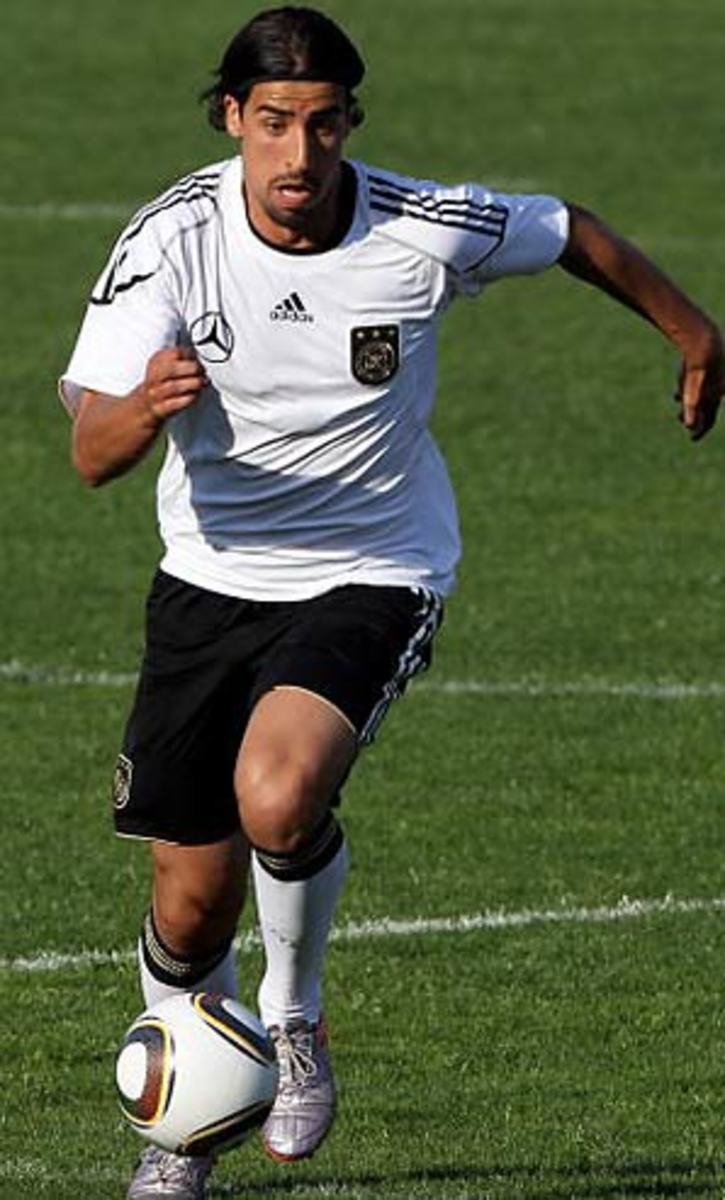Ballack's injury leaves Germany struggling to find replacements
Löw won't have to make that particular decision now. Träsch picked up a nasty ankle injury in a friendly against third division Italian side FC Südtirol on Monday night and can't play in South Africa. What would have been a minor if not inconsequential blow for Germany under normal circumstances has, however, suddenly acquired the potential for a full-blown crisis of confidence. Träsch, an eager all-rounder, was desperately needed as a backup option for club teammate Sami Khedira who in turn has become a guaranteed starter in place of the injured captain Michael Ballack (FC Chelsea). "It's a big shame, he would have made it into the final squad," said Löw. Träsch' untimely departure from the Tyrolean training camp leaves Löw with the grand sum of two fit central midfielders (Khedira and Bastian Schweinsteiger of Bayern Munich) for the two key positions in his preferred 4-2-3-1 system. "The squad has become seriously unbalanced," wrote Süddeutsche Zeitung.
Germany's predicament is almost ironic. Throughout the decade, the national team has suffered from having too many defensive midfielders, not too few. Eight of them made it into the 2002 World Cup squad, a measure of the shortage of genuine quality forwards or creative types at the time. Four years later, then-coach Jürgen Klinsmann took five holding players to the competition.
A similar number would have been in Löw's squad had it not been for series of injuries and unfortunate events. Bayer Leverkusen's Simon Rolfes, one of the outstanding performers in the first half of the Bundesliga season, suffered a serious knee injury in the winter. Thomas Hitzlsperger, who had excelled in a central role at the 2008 European Championship, lost his starting berth at Stuttgart and didn't get much playing time after making a loan-move to Serie A side SS Lazio in January, either. Veteran Torsten Frings publicly fell out with Löw after the Euros. Despite plenty of popular support for the Werder Bremen skipper, there's no way back for the irascible 33-year-old. This month, "the curse of the No. 6," as Der Spiegel called it -- "No. 6" is German football-speak for the position in front of the back four -- struck both Ballack and Träsch.
Löw's assistant Hansi Flick has, somewhat surprisingly, ruled out drafting in additional cover, at least for the time being. The management team believes that Heiko Westermann of Schalke 04, a defender by trade, could fill in for Schweinsteiger or Khedira. The 26-year-old has played in midfield for his club before, but never at international level. Technically, he's a little limited. Philipp Lahm has also been touted as an emergency "No. 6." The Bayern Munich fullback has been tried successfully in the center by Löw in a 2007 friendly against England at Wembley and would probably combine well with club teammate Schweinsteiger. But his repositioning would create another, potentially even bigger problem at the back. Furthermore, a Schweinsteiger-Lahm duo can't quite be trusted to deal with the physical challenge posed by Germany's group stage opponents Ghana, Australia and Serbia. Neither of them share Ballack's experience and willingness to battle. The 33-year-old Ballack warned this week that "Germany could lose against any of these robust, athletic teams." Some of the optimism that greeted Bayern Munich's advance to the Champions League final over the last few weeks has certainly given way to fear of "the catastrophe" (Ballack): an early exit after the group stage.
Saturday night's friendly against Hungary in Budapest will certainly test Germany's new defensive duo and possible alternatives. Even if his team does well, Löw must have already come to regret his earlier announcement that all six forwards in the preliminary squad -- Thomas Müller, Miroslav Klose, Mario Gomez (all Bayern), Stefan Kießling (Leverkusen), Lukas Podolski (Köln) and naturalised Brazilian Cacau (Stuttgart) -- would definitely make it to the finals. Flick was privately retreating from that guarantee this week, conscious that a striker might have to be sacrificed for an additional defensive midfielder after all. "You'll have to wait for June 1 [when the deadline for the final squad nomination expires]," Flick told reporters in Germany's Eppan training base.
Kießling looks most vulnerable in that respect. Two out of Dennis Aogo, Piotr Trchowski (both Hamburg) and Andreas Beck (Hoffenheim) will probably be left behind as well.
But who would grab the last-minute stand-by ticket? Sources close to the Germany camp believe Löw would be likely to call on Hitzlsperger, who is currently keeping in shape by himself under the guidance of former national team fitness coach Oliver Schmidtlein. The 28-year-old midfielder is known for his loyalty, fierce left-foot drive and tremendous social skills; in many ways he 's the ideal candidate to come in as a backup for the backups. A distinct lack of match fitness works against him though, and politically, his nomination would be hard to justify.
Mats Hummels of Dortmund might well prove a more popular choice. The 21-year-old center back has had a very good season in the Bundesliga, and he's also played in midfield for Germany before. At last year's final win against England in the U-21 European Championships, Hummels had an outstanding game in a central role mopping up in front of the defenders.
Löw and his staff have so far put on a very brave face. There's no need to panic, they insist. But lack of adequate cover for the very core of the team should make a change of tack imperative. Another injury scare on Wednesday, when Müller fell off his mountain bike during an exercise but suffered only superficial wounds proved that gambling on the fitness of only two central midfield specialists is a risk that Germany cannot take. There's simply not enough room for error in Group D.





